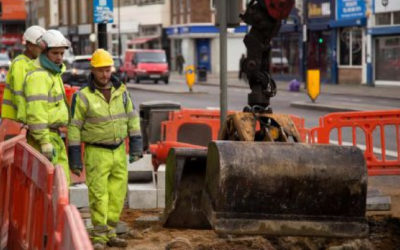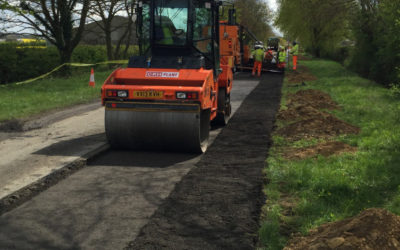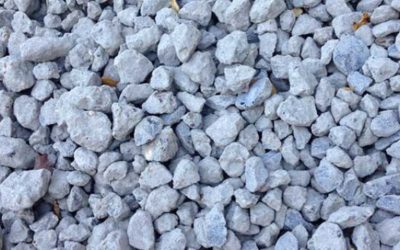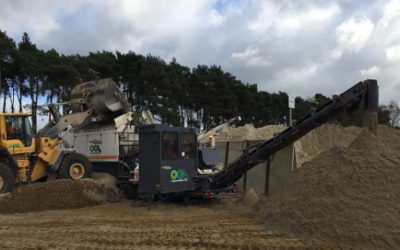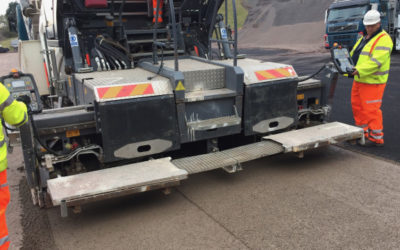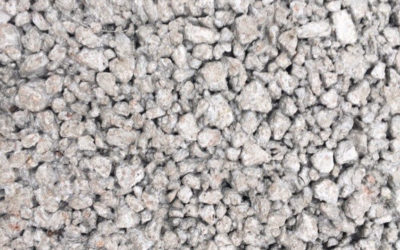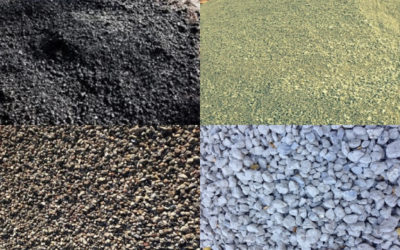In recent years, the circular economy has gained significant attention as a solution to address the negative environmental impact caused by the linear economy. One of the critical components of the circular economy is the recycling of waste, including road waste. Recycling road waste is an essential element of the circular economy and offers several benefits such as reducing the need for virgin aggregates, minimising waste disposal, decreasing transportation emissions, and lessening environmental impacts. In this article, we will explore the benefits of recycling road waste in the circular economy, specifically through the use of Cold Recycled Bound Material (CRBM).
The Benefits of Recycling Road Waste in the Circular Economy
Road construction and maintenance generate significant waste, including concrete and asphalt. According to the UK government, more than 60 million tonnes of aggregates are used annually in the UK, and 29% of this material is used for road construction and maintenance. However, the traditional road construction process is linear, with materials being produced, used, and disposed of, creating a significant negative impact on the environment.
Recycling road waste is an essential element of the circular economy as it provides a sustainable solution to the management of construction waste. By recycling road waste, there is a reduction in the need for virgin aggregates, which helps to minimise waste disposal and decrease transportation emissions. The use of CRBM is an innovative technique that repurposes traditional road materials, such as concrete and asphalt, for new road construction and maintenance.
What is Cold Recycled Bound Material (CRBM)?
CRBM is a sustainable material solution that has been developed in the UK. The manufacturing process of CRBM involves recycling existing road materials, such as concrete and asphalt, to create a bound base and binder course material that is used for new road construction and maintenance.
The manufacturing process of CRBM involves the following steps:
- The existing road materials are pulverised to create a granular material.
- The granular material is mixed with a bitumen emulsion, water, and cement.
- The mixture is compacted to create a stable base layer that is used for new road construction.
- A second layer is added using a modified version of the traditional road surfacing method.
What are the Benefits of CRBM?
CRBM offers several benefits that make it an attractive option for the construction industry. One of the primary benefits of CRBM is that it improves control over the materials used in the pavement. The use of CRBM allows for the recycling of existing road materials, which reduces the need for virgin aggregates and minimises waste disposal. This reduces the environmental impact of road construction and maintenance and helps to promote sustainability.
Another benefit of CRBM is that it reduces the waste resulting from unused material. Traditional road construction methods often result in waste materials that are not used, leading to increased waste disposal and negative environmental impacts. However, the use of CRBM helps to minimise waste by repurposing existing materials and reducing the need for virgin aggregates.
The use of CRBM also results in a reduction of CO2 emissions. Traditional road construction methods require the use of significant amounts of energy to produce and transport materials. However, the use of CRBM reduces the need for virgin aggregates, which helps to minimise transportation emissions and energy consumption.
Mitigating Negative Environmental Impacts and Supply Chain Risk
Recycling road waste through the CRBM technique has a significant positive impact on the environment. According to a report published by the European Commission, the construction industry generates around 25% of the total waste produced within the European Union, and only a small portion of this waste is currently being recycled. Recycling road waste can help reduce the amount of waste sent to landfills, which helps in preserving natural resources and reducing the environmental impact of landfills.
In addition to reducing waste, recycling road waste through CRBM also helps mitigate supply chain risk. The construction industry is dependent on the availability of raw materials, such as aggregates and bitumen, which can be volatile in price and supply. By utilising recycled materials, the construction industry can reduce its reliance on raw materials from the market, making it less susceptible to supply chain disruptions and price fluctuations. Furthermore, the use of recycled materials can also reduce the competition for natural resources, helping to ensure their long-term availability for future generations.
Adopting a circular supply chain can give businesses a significant advantage, especially during times of uncertainty, such as the recent COVID-19 pandemic. The pandemic has led to several construction projects being suspended or delayed, causing a limited availability of key building materials. By using recycled materials in road construction, businesses can ensure a consistent supply of materials and reduce the risk of project delays due to material shortages.
Take Action to Recycle Road Waste Today
Recycling road waste is a crucial step towards achieving a circular economy. The use of innovative techniques such as CRBM can help reduce the environmental impact of road construction, decrease waste disposal, and cut down on transportation emissions.
The benefits of adopting a circular supply chain for road construction are clear, from reducing supply chain risks to mitigating negative environmental impacts. Recycling road waste can also reduce the dependence on raw materials and help businesses stay competitive in an uncertain market.
Local councils can play a significant role in implementing and promoting the recycling of road waste. They have the power to create policies that support circular practices and encourage businesses to adopt sustainable approaches to road construction.
It is time for local councils to take action and prioritise the recycling of road waste in their communities. By doing so, they can not only benefit the environment but also save money and promote economic growth.
OCL works with a number of forward-thinking authorities that are committed to working towards a sustainable future by recycling road waste and promoting a circular economy. If you’d like to learn more, get in touch today.

